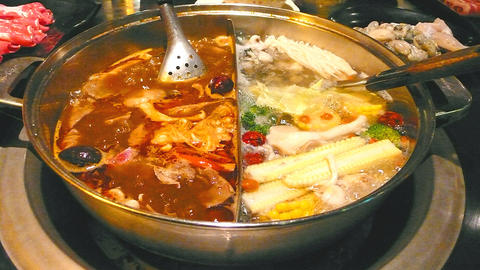Mala Yuanyang Hot Pot (馬辣鴛鴦火鍋)
Address: 86, Dingzhou Rd Sec 3, Taipei (台北市汀州路三段86號)
Telephone: (02) 2365-7625

PHOTO: HO YI,TAIPEI TIMES
Open: Daily from 11:30am to 5am
Average meal: NT$359 from 11:30am to 4pm; NT$399 on holidays and weekdays from 4pm to 5am, plus 10 percent service charge
Details: Menu in Chinese; credit cards not accepted
On the Net: www.mala-1.com.tw
The frequent long lines outside of Mala Yuanyang (馬辣鴛鴦火鍋) first aroused my curiosity. Several failed attempts at getting a reservation prompted me to call on a Monday when business is supposed to be slowest.
"We won't have a vacancy till 9:30pm. Is that alright?" the woman on the other end of the phone asked, with an air of efficient dependability. It was.
Unfortunately, that dependable air was just that, an air. After arriving on time, we were told we weren't on the waiting list. "Don't worry, we'll have a table for you in a minute," the server at the counter said.
After being shown to our seats, the annoyance was quickly forgotten. Like many upscale places serving spicy hot pot (麻辣火鍋) in Taipei's East District (東區), Mala Yuanyang has a relaxing, lounge-bar vibe.
The restaurant has only two rules: There is a two-hour time limit and the meat, which is unlimited, must be ordered.
All food except the meat - including Black Angus beef, mutton, chicken and sirloin steak - is located at the all-you-can-eat section.
Mala Yuanyang serves its hot pot in a pan divided in two. There are four kinds of broth to choose from: spicy, which boasts 38 Chinese medicinal herbs, vegetable, pickled cabbage and another made of fish skin, tendons, sea cucumbers and kelp.
The spicy half won praise for its flavorful, but not painful, kick. The meat was fresher and of much higher quality than usually served at other restaurants in the same price range.
The buffet section stands out for both quantity and quality of the food. The spread includes the basics plus less traditional selections like frog legs, lotus root, shark skin, marinated chicken hearts and claws, scallops, shrimps, crabs, clams and sailfish.
Organic sweet potatoes can be heated on the pot handles for a healthy desert, but we couldn't resist the Haagen-Dazs ice cream, of which the restaurant serves eight flavors.
The servers are in general attentive. Special care is taken to cover bags and jackets with black bags so the hot pot odor doesn't sully them.

This month the government ordered a one-year block of Xiaohongshu (小紅書) or Rednote, a Chinese social media platform with more than 3 million users in Taiwan. The government pointed to widespread fraud activity on the platform, along with cybersecurity failures. Officials said that they had reached out to the company and asked it to change. However, they received no response. The pro-China parties, the Chinese Nationalist Party (KMT) and Taiwan People’s Party (TPP), immediately swung into action, denouncing the ban as an attack on free speech. This “free speech” claim was then echoed by the People’s Republic of China (PRC),

Exceptions to the rule are sometimes revealing. For a brief few years, there was an emerging ideological split between the Democratic Progressive Party (DPP) and Chinese Nationalist Party (KMT) that appeared to be pushing the DPP in a direction that would be considered more liberal, and the KMT more conservative. In the previous column, “The KMT-DPP’s bureaucrat-led developmental state” (Dec. 11, page 12), we examined how Taiwan’s democratic system developed, and how both the two main parties largely accepted a similar consensus on how Taiwan should be run domestically and did not split along the left-right lines more familiar in

Specialty sandwiches loaded with the contents of an entire charcuterie board, overflowing with sauces, creams and all manner of creative add-ons, is perhaps one of the biggest global food trends of this year. From London to New York, lines form down the block for mortadella, burrata, pistachio and more stuffed between slices of fresh sourdough, rye or focaccia. To try the trend in Taipei, Munchies Mafia is for sure the spot — could this be the best sandwich in town? Carlos from Spain and Sergio from Mexico opened this spot just seven months ago. The two met working in the

Many people in Taiwan first learned about universal basic income (UBI) — the idea that the government should provide regular, no-strings-attached payments to each citizen — in 2019. While seeking the Democratic nomination for the 2020 US presidential election, Andrew Yang, a politician of Taiwanese descent, said that, if elected, he’d institute a UBI of US$1,000 per month to “get the economic boot off of people’s throats, allowing them to lift their heads up, breathe, and get excited for the future.” His campaign petered out, but the concept of UBI hasn’t gone away. Throughout the industrialized world, there are fears that